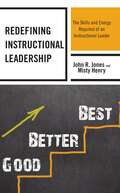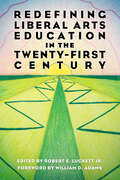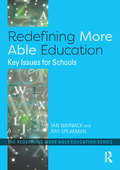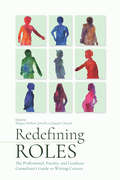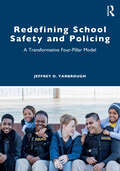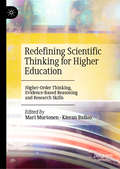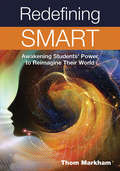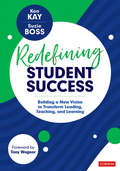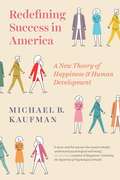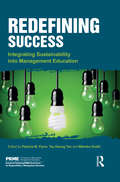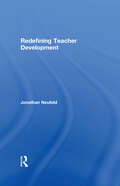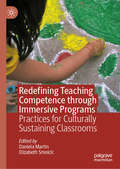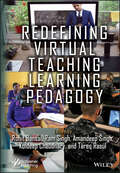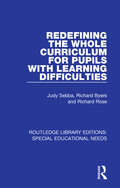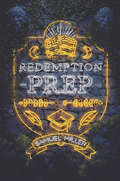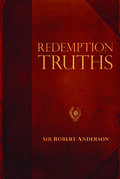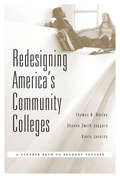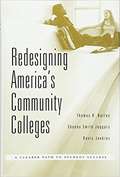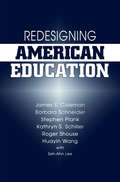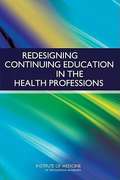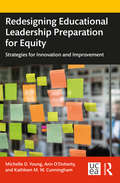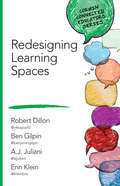- Table View
- List View
Redefining Instructional Leadership: The Skills And Energy Required Of An Instructional Leader
by John R. Jones Misty HenryRedefining Liberal Arts Education in the Twenty-First Century
by Robert E. LuckettContributions by William D. Adams, Sarah Archino, Mario J. Azevedo, Katrina Byrd, Rico D. Chapman, Helen O. Chukwuma, Monica Flippin Wynn, Tatiana Glushko, Eric J. Griffin, Kathi R. Griffin, Yumi Park Huntington, Thomas M. Kersen, Robert E. Luckett Jr., Floyd W. Martin, Preselfannie W. McDaniels, Dawn Bishop McLin, Lauren Ashlee Messina, Byron D'Andra Orey, Kathy Root Pitts, Candis Pizzetta, Lawrence Sledge, RaShell R. Smith-Spears, Joseph Martin Stevenson, Seretha D. Williams, and Karen C. Wilson-Stevenson Redefining Liberal Arts Education in the Twenty-First Century delves into the essential nature of the liberal arts in America today. During a time when the STEM fields of science, technology, engineering, and math dominate the narrative around the future of higher education, the liberal arts remain vital but frequently dismissed academic pursuits. While STEAM has emerged as a popular acronym, the arts get added to the discussion in a way that is often rhetorical at best. Written by scholars from a diversity of fields and institutions, the essays in this collection legitimize the liberal arts and offer visions for the role of these disciplines in the modern world. From the arts, pedagogy, and writing to social justice, the digital humanities, and the African American experience, the essays that comprise Redefining Liberal Arts Education in the Twenty-First Century bring attention to the vast array of ways in which the liberal arts continue to be fundamental parts of any education. In an increasingly transactional environment, in which students believe a degree must lead to a specific job and set income, colleges and universities should take heed of the advice from these scholars. The liberal arts do not lend themselves to the capacity to do a single job, but to do any job. The effective teaching of critical and analytical thinking, writing, and speaking creates educated citizens. In a divisive twenty-first-century world, such a citizenry holds the tools to maintain a free society, redefining the liberal arts in a manner that may be key to the American republic.
Redefining More Able Education: Key Issues for Schools (Redefining More Able Education)
by Ian Warwick Ray SpeakmanRedefining More Able Education is an essential, up to date and challenging introduction to the many factors involved in teaching more able students. Written by Ian Warwick, founder of London Gifted and Talented, and Ray Speakman, this book challenges our understanding of provision for the more able and explores ways in which we can ensure that students reach their full potential. Providing a thorough overview of topical research, the book offers a range of practical solutions for engaging students and encouraging them to become more independent in their learning. Warwick and Speakman explore key ideas including differentiation, resilience and motivation, and unpick issues including the history of more able education, the relationship between intelligence and achievement, working with marginalised groups and how students can overcome barriers when applying to top universities. A dedicated chapter summarises 21 easy-to-implement strategies that can make a real difference to teaching practice. This definitive guide to more able education will be essential reading for teachers, school leaders and any education professionals reflecting on different approaches to motivating and teaching the more able in order to better provide for all their students.
Redefining Roles: The Professional, Faculty, and Graduate Consultant’s Guide to Writing Centers
by Megan Swihart Jewell Joseph CheatleRedefining Roles is the first book to recognize and provide sustained focus on the presence of professional, faculty, and graduate student consultants in writing centers. A significant number of writing centers employ non-peer consultants, yet most major training manuals are geared toward undergraduate tutoring practices or administrators. This collection systematically addresses this gap in the literature while initiating new conversations regarding writing center staffing. Thirty-two authors, consultants, and administrators from diverse centers—from large public four-year institutions to a private, online for-profit university—provide both theoretical frameworks and practical applications in eighteen chapters. Ten chapters focus on graduate consultants and address issues of authority, training, professional development, and mentoring, and eight focus on professional and faculty consultant training as well as specific issues of identity and authority. By sharing these voices, Redefining Roles broadens the very idea of writing centers while opening the door to more dialogue on the important role these practitioners play. Redefining Roles is designed for writing center practitioners, scholars, and staff. It is also a necessary addition to help campus administrators in the ongoing struggle to validate the intellectually complex work that such staff performs. Contributors: Fallon N. Allison, Vicki Behrens, Cassie J. Brownell, Matt Burchanoski, Megan Boeshart Burelle, Danielle Clapham, Steffani Dambruch, Elise Dixon, Elizabeth Festa, Will Fitzsimmons, Alex Frissell, Alex Funt, Genie Giaimo, Amanda Gomez, Lisa Lamson, Miriam E. Laufer, Kristin Messuri, Rebecca Nowacek, Kimberly Fahle Peck, Mark Pedretti, Irina Ruppo, Arundhati Sanyal, Anna Scanlon, Matthew Sharkey-Smith, Kelly A. Shea, Anne Shiell, Anna Sicari, Catherine Siemann, Meagan Thompson, Lisa Nicole Tyson, Marcus Weakley, Alex Wulff
Redefining School Safety and Policing: A Transformative Four-Pillar Model
by Jeffrey D. YarbroughRedefining School Safety and Policing identifies and works to eliminate systemic issues in school policing that negatively impact students of color, LGBTQIA+ students, and other marginalized populations. Focusing on the fundamental goal of creating safe learning environments, Yarbrough lays out the unintended consequences of involving police in the administrative disciplinary process, as agents of school administrators and enforcers of zero-tolerance policies. Behavioral health support is important to students going through social, emotional, and mental health crises. True equity work brings everyone to a safe space in the middle, encouraging open discussion and courageous dialogue and aiming to create positive change. Yarbrough argues that behavioral health and racial equity are vital to transforming school policing and providing beneficial alternative solutions to school policing that do not lead students to the juvenile or criminal justice system. This book is suitable for colleges and universities, K-12 school administrators, teachers, police and school resource officers, counselors, social workers, and community activists.
Redefining Scientific Thinking for Higher Education: Higher-Order Thinking, Evidence-Based Reasoning and Research Skills
by Mari Murtonen Kieran BallooThis book examines the learning and development process of students’ scientific thinking skills. Universities should prepare students to be able to make judgements in their working lives based on scientific evidence. However, an understanding of how these thinking skills can be developed is limited. This book introduces a new broad theory of scientific thinking for higher education; in doing so, redefining higher-order thinking abilities as scientific thinking skills. This includes critical thinking and understanding the basics of science, epistemic maturity, research and evidence-based reasoning skills and contextual understanding. The editors and contributors discuss how this concept can be redefined, as well as the challenges educators and students may face when attempting to teach and learn these skills. This edited collection will be of interest to students and scholars of student scientific skills and higher-order thinking abilities.
Redefining Smart: Awakening Students’ Power to Reimagine Their World
by Thom MarkhamEquip Your Students To Create Their Own Intellectual Destiny! The best teachers are the ones who can empower students to ask intelligent questions and persistently seek the answers. In this book you’ll find a proven, detailed method for how to do this, by learning: A groundbreaking new approach to content delivery and instruction, geared towards maximizing student discovery, deep thought, exploration and creativity Why educators must let go of student IQ as a concept that influences teaching methods in any way How to create a protocol-driven environment that fosters deep sharing and reflection
Redefining Smart: Awakening Students’ Power to Reimagine Their World
by Thom MarkhamEquip Your Students To Create Their Own Intellectual Destiny! The best teachers are the ones who can empower students to ask intelligent questions and persistently seek the answers. In this book you’ll find a proven, detailed method for how to do this, by learning: A groundbreaking new approach to content delivery and instruction, geared towards maximizing student discovery, deep thought, exploration and creativity Why educators must let go of student IQ as a concept that influences teaching methods in any way How to create a protocol-driven environment that fosters deep sharing and reflection
Redefining Student Success: Building a New Vision to Transform Leading, Teaching, and Learning
by Suzie Boss Ken KayBe the leader of a fresh, bold, enduring vision of education for your district or school. The future of learning has arrived, and it requires bold educational leadership and a dramatic redefinition of what it means to be a successful student today. Redefining Student Success invites you to lead this transformation with audacity. It engages leaders with the concepts and actions needed to reimagine schools, address inequities, and help today’s students develop the skills they need for personal, economic, and civic success. This vital guide supports transformative leadership with Concrete guidance on how to create a Portrait of a Graduate and Portrait of an Educator which will help ensure teachers have a unified vision for professional growth and student success. Reflection prompts that help you recognize your strengths, spark discussion among stakeholders, and identify next steps for inspired action. Compelling examples of students already engaged in creative, self-directed problem-solving around issues that matter to them and their communities, together with stories that illustrate how districts and schools have arrived at their own vision of what education must become. Companion guides to 21st century learning for parents and students available online. The time is now to reset educational outcomes, sync schools with the demands of 21st century society, and meet the needs of every learner, in every community.
Redefining Student Success: Building a New Vision to Transform Leading, Teaching, and Learning
by Suzie Boss Ken KayBe the leader of a fresh, bold, enduring vision of education for your district or school. The future of learning has arrived, and it requires bold educational leadership and a dramatic redefinition of what it means to be a successful student today. Redefining Student Success invites you to lead this transformation with audacity. It engages leaders with the concepts and actions needed to reimagine schools, address inequities, and help today’s students develop the skills they need for personal, economic, and civic success. This vital guide supports transformative leadership with Concrete guidance on how to create a Portrait of a Graduate and Portrait of an Educator which will help ensure teachers have a unified vision for professional growth and student success. Reflection prompts that help you recognize your strengths, spark discussion among stakeholders, and identify next steps for inspired action. Compelling examples of students already engaged in creative, self-directed problem-solving around issues that matter to them and their communities, together with stories that illustrate how districts and schools have arrived at their own vision of what education must become. Companion guides to 21st century learning for parents and students available online. The time is now to reset educational outcomes, sync schools with the demands of 21st century society, and meet the needs of every learner, in every community.
Redefining Success in America: A New Theory of Happiness and Human Development
by Michael KaufmanWork hard in school, graduate from a top college, establish a high-paying professional career, enjoy the long-lasting reward of happiness. This is the American Dream—and yet basic questions at the heart of this competitive journey remain unanswered. Does competitive success, even rarified entry into the Ivy League and the top one percent of earners in America, deliver on its promise? Does realizing the American Dream deliver a good life? In Redefining Success in America, psychologist and human development scholar Michael Kaufman develops a fundamentally new understanding of how elite undergraduate educations and careers play out in lives, and of what shapes happiness among the prizewinners in America. In so doing, he exposes the myth at the heart of the American Dream. Returning to the legendary Harvard Student Study of undergraduates from the 1960s and interviewing participants almost fifty years later, Kaufman shows that formative experiences in family, school, and community largely shape a future adult’s worldview and well-being by late adolescence, and that fundamental change in adulthood, when it occurs, is shaped by adult family experiences, not by ever-greater competitive success. Published research on general samples shows that these patterns, and the book’s findings generally, are broadly applicable to demographically varied populations in the United States. Leveraging biography-length clinical interviews and quantitative evidence unmatched even by earlier landmark studies of human development, Redefining Success in America redefines the conversation about the nature and origins of happiness, and about how adults develop. This longitudinal study pioneers a new paradigm in happiness research, developmental science, and personality psychology that will appeal to scholars and students in the social sciences, psychotherapy professionals, and serious readers navigating the competitive journey.
Redefining Success: Integrating Sustainability into Management Education (The Principles for Responsible Management Education Series)
by Patricia M. Flynn Tay Keong Tan Milenko GudićRedefining Success: Integrating Sustainability into Management Education advocates incorporating sustainability concepts that go beyond the financial ‘bottom line’ into management education and business practice. Highlighting the UN Global Compact (UNGC), the Principles for Responsible Management Education (PRME) and the Sustainability Development Goals (SDGs), it explores conceptual and practical issues, presents case studies and other empirical evidence, and offers solutions that will both encourage and assist management educators in the incorporation of sustainability into their courses and research. incorporating sustainability into their courses and research. Written by 34 individuals from 17 countries, the book addresses these topics from a variety of theoretical, disciplinary, geographic and organizational perspectives. The authors demonstrate how management educators, collaborating with business and civic organizations, can be change agents for a better world. Written for educators, scholars and business practitioners, the volume concludes with lessons learned, challenges encountered, and implications for responsible management education.
Redefining Teacher Development
by Jonathan NeufeldHas any occupational group been the subject of as much research as elementary or primary school teachers? Written by a former elementary school teacher, this intensive study considers how the foundations of the ongoing teacher reform movement have appealed to researchers through its successive stages. By tracing these ideas back to their historical roots, Jonathan Neufeld illustrates how they actually descend from the physical and biological sciences rather than from student/teacher relationships. Neufeld’s in-depth analysis of economic trends during the 20th century shows how economic and educational reforms are closely related. He demonstrates how the century-long movement to develop teachers became obsessed with turning them into soldiers of a failing economy. This book rewrites the existing foundations and outlines a future direction that will excite researchers and practitioners alike. It introduces alternative theoretical foundations and propositions to inspire innovative discussions about teachers’ continuing educational development and what it could mean to teach children in classrooms. Since the publication of A Nation at Risk in 1982, "teacher development" has become a universal term, used to express an international movement to professionalize teachers. But imagine if the foundations of this research had little to do with life in the classroom. How would we then begin to discover what "development" means to practising teachers? Redefining Teacher Development will appeal to researchers in teacher instruction and development, as well as practising teachers with an interest in how research has conceptualised their field.
Redefining Teaching Competence through Immersive Programs: Practices for Culturally Sustaining Classrooms
by Daniela Martin Elizabeth SmolcicThis edited book examines how teacher education utilises international immersion and field teaching (or service-learning) experience to develop teachers’ global, multilingual and intercultural competencies, in preparation for entering today’s culturally and linguistically diverse classrooms. Through a series of theory-based case studies, the authors demonstrate how teachers’ awareness of social inequities and responsive actions, the ability to bridge one’s own and others’ perspectives, and understanding of key principles of second language learning are pedagogical concepts and skills that become ever more essential across all mainstream K-12 educational contexts. The chapters bring together the voices of teacher educators, intercultural learning theorists and pre- and in-service teachers to identify threads of practice and theory that can be applied within teacher education more broadly. This book will be of interest to academics, instructors and graduate students in the fields of teacher education, language learning, intercultural communication and social justice education.
Redefining Virtual Teaching Learning Pedagogy
by Ram Singh Rohit Bansal Amandeep Singh Kuldeep Chaudhary Tareq RasulRedefining Virtual Teaching Learning Pedagogy Online education is now a growing and critical piece of modern-day infrastructure and this book details how virtual teaching and learning can continue to be transformed through leveraging digital platforms. In the current technology-driven era, education systems are undergoing major changes by adopting advanced digital education strategies. Schools, colleges, and universities around the world have swiftly switched to online delivery modes. Students are learning via new platforms and the use of narrated lectures, podcasts, online quizzes, and other e-learning materials has increased. Virtual learning improves the educational experience, transforms teaching and learning, and provides rich, diverse, and flexible learning opportunities for the digital generation. It also makes students able to gain, share and verify knowledge through different sources such as social media communities, blogging, web-based content writing, video-based learning, etc. The main focus of “Redefining Virtual Teaching Learning Pedagogy” is to bring together leading academic scientists, researchers, and research scholars to exchange and share their experiences and results on all aspects of virtual learning and teaching. The chapters mainly focus on 6 critical areas of virtual teaching and learning: Curriculum and learning objectives Learning materials Pedagogic processes Classroom assessment frameworks Teacher support in the classrooms School leadership and management development. Audience Educators, researchers, academicians, entrepreneurs, and corporate professionals will gain knowledge and be updated about the role & future of virtual teaching and learning and the latest digital tools used for that purpose.
Redefining the Whole Curriculum for Pupils with Learning Difficulties (Routledge Library Editions: Special Educational Needs #46)
by Richard Rose Judy Sebba Richard ByersFirst published in 1995. This book is about the issues in the education of pupils with learning difficulties. It redefines the relationship between the established curriculum for pupils with learning difficulties, the whole curriculum and the National Curriculum within the context of personal and social development. Particular themes running through the book include the ways in which the individual needs of pupils can be met through group work and planning for meaningful pupil involvement.
Redemption Prep
by Samuel MillerTwin Peaks meets Riverdale in this twisty atmospheric mystery from the critically acclaimed author of A Lite Too Bright, Samuel Miller, about the search for a missing girl at an elite prep school. <P><P>Everyone knows Emma. Neesha’s her best friend, Aiden’s her basketball star boyfriend, and Evan’s her shadow, following Emma’s every move.Emma stands out, which is hard to do at Redemption Prep, a school where every student has been handpicked to attend its remote campus in the forest of Utah. So when she goes missing in plain sight during mass, everyone notices.And everyone becomes a suspect, especially at a school with so many rules: Don’t skip mass. Don’t break curfew. Don’t go into the woods. <P><P>Emma’s disappearance ignites an investigation, and Neesha, Aiden, and Evan all want to find her—for different reasons. But they each have their own secrets to hide, and not everyone wants Emma to be found.As the search continues, the students start to realize that they’re not the only ones trying to hide something. Redemption Prep has secrets, too—secrets bigger than any of the students could have imagined, and Emma could be the key to finding out the truth . . . if anyone can find her. <P><P><b>A New York Times Bestseller</b>
Redemption Truths (Sir Robert Anderson)
by Sir Robert AndersonA concise and classic study of the doctrine of salvation. Includes biographical sketch by Warren W. Wiersbe.
Redesigning America's Community Colleges: A Clearer Path to Student Success
by Thomas R. Bailey Shanna Smith Jaggars Davis JenkinsIn the United States, 1,200 community colleges enroll over ten million students each year―nearly half of the nation’s undergraduates. Yet fewer than 40 percent of entrants complete an undergraduate degree within six years. This fact has put pressure on community colleges to improve academic outcomes for their students. Redesigning America’s Community Colleges is a concise, evidence-based guide for educational leaders whose institutions typically receive short shrift in academic and policy discussions. It makes a compelling case that two-year colleges can substantially increase their rates of student success, if they are willing to rethink the ways in which they organize programs of study, support services, and instruction.
Redesigning America's Community Colleges: A Clearer Path to Student Success
by Thomas R. BaileyCommunity colleges enroll half of the nation's undergraduates. Yet only 40 percent of entrants complete an undergraduate degree in six years. Redesigning America's Community Colleges explains how two-year colleges can increase their students' success rate quickly and at less cost, through a program of guided pathways to completion.
Redesigning American Education
by James ColemanDrawing on several principles of sociological theory, James S. Coleman and his colleagues construct a new design for American schooling. The authors present compelling evidence on the deficits of our educational system compared to other countries, arguing that the problems are the result of inappropriate incentives for teachers, students, and parents.Asserting that most American school systems are driven by administrative needs, the authors propose school designs that would shift the focus to student achievement output as the driving force behind public education. The move from an administratively driven system to an output-driven system would require the use of external standards; a method of evaluating school and student performance gains over time; a means of rewarding students, teachers and parents for academic performance gains; and the encouragment of informal norms that would support the new educational goals. Basing their recommendations on two national longitudinal data sets, each with a sample of over 1000 schools exhibiting variations in organizational design, the authors identify specific variations that have been shown to promote growth and achievement.
Redesigning Continuing Education in the Health Professions
by Institute of Medicine of the National AcademiesToday in the United States, the professional health workforce is not consistently prepared to provide high quality health care and assure patient safety, even as the nation spends more per capita on health care than any other country. The absence of a comprehensive and well-integrated system of continuing education (CE) in the health professions is an important contributing factor to knowledge and performance deficiencies at the individual and system levels. To be most effective, health professionals at every stage of their careers must continue learning about advances in research and treatment in their fields (and related fields) in order to obtain and maintain up-to-date knowledge and skills in caring for their patients. Many health professionals regularly undertake a variety of efforts to stay up to date, but on a larger scale, the nation's approach to CE for health professionals fails to support the professions in their efforts to achieve and maintain proficiency. Redesigning Continuing Education in the Health Professions illustrates a vision for a better system through a comprehensive approach of continuing professional development, and posits a framework upon which to develop a new, more effective system. The book also offers principles to guide the creation of a national continuing education institute.
Redesigning Educational Leadership Preparation for Equity: Strategies for Innovation and Improvement
by Michelle D. Young Ann O'Doherty Kathleen M.W. CunninghamDelivering equity for PK-12 learners is an essential aim for educational leadership preparation programs. This book serves as a resource for equity-focused design and redesign thorough innovation, improvement and impact. Based on direct experience while also drawing from innovative exemplars, and unpacking a decade of program improvement practice, this book explores how to foster partnerships and pipelines, recruit and select candidates, map the curriculum, develop powerful learning experiences, create field experiences, design program evaluation, and support faculty learning. Chapters open with a vignette that presents scenarios in which many faculty members find themselves, particularly when programs are in need of improvement. Drawing on years of experience facilitating redesign, the authors offer both processes and resources to assist faculty, including diagnostic tools, sample agendas, templates, guiding questions, and suggested protocols. Whether facing new accreditation requirements, state program approval changes, institutional redesign challenges or as part of a grant funded redesign, this book is a critical resource for educational leadership faculty and program coordinators looking to garner the appropriate resources, ask the right questions, and follow reliable processes in program design and continuous improvement toward equity. Chapter resources and templates available for download online at https://www.routledge.com/9780367673543 on the tab that is entitled "Support Material." Please also join Redesign.Improve.Innovate—an online forum focused on preparation and practice improvement found here: www.RedesignImproveInnovate.org.
Redesigning Learning Spaces (Corwin Connected Educators Series)
by Benjamin D. Gilpin Erin M. Klein Robert W. Dillon A. J. JulianiIt is time for the desks to lose and the children to win Bring hope, joy, and positive energy back into the daily work of the classroom. Explore how learning space design can positively impact classroom learning, the culture of a school, healthy communities, and systems and structures that make education meaningful. In this book you’ll: Find resources for redesigning spaces on a sustainable budget Support technology integration through b¬¬lended and virtual learning Hear success stories from the field The Corwin Connected Educators series is your key to unlocking the greatest resource available to all educators: other educators. Being a Connected Educator is more than a set of actions; it’s a belief in the potential of technology to fuel lifelong learning. "Redesigning Learning Spaces will take you beyond the standard classroom with ideas for creating spaces that sizzle with excitement and glow with beauty and grace." —Daniel H. Pink, author of Drive and A Whole New Mind "As a son of teachers, as a parent, and as a technologist, I recommend this book for educators who want to create a better learning experience for our children." —Gary Shapiro, author of Ninja Innovation and The Comeback
Redesigning Learning Spaces (Corwin Connected Educators Series)
by Benjamin D. Gilpin Erin M. Klein Robert W. Dillon A. J. JulianiIt is time for the desks to lose and the children to win Bring hope, joy, and positive energy back into the daily work of the classroom. Explore how learning space design can positively impact classroom learning, the culture of a school, healthy communities, and systems and structures that make education meaningful. In this book you’ll: Find resources for redesigning spaces on a sustainable budget Support technology integration through b¬¬lended and virtual learning Hear success stories from the field The Corwin Connected Educators series is your key to unlocking the greatest resource available to all educators: other educators. Being a Connected Educator is more than a set of actions; it’s a belief in the potential of technology to fuel lifelong learning. "Redesigning Learning Spaces will take you beyond the standard classroom with ideas for creating spaces that sizzle with excitement and glow with beauty and grace." —Daniel H. Pink, author of Drive and A Whole New Mind "As a son of teachers, as a parent, and as a technologist, I recommend this book for educators who want to create a better learning experience for our children." —Gary Shapiro, author of Ninja Innovation and The Comeback
